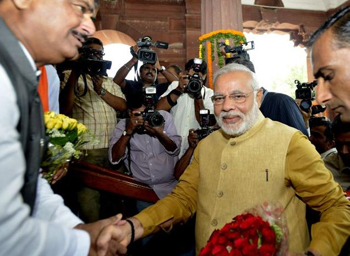 New Delhi, May 24: Prime minister-designate Narendra Modi is giving final shape to a compact “right-sized” council of ministers, which may see the BJP offering its allies at least one Cabinet and two Ministers of State (MoS) berths, depending on their tally of Lok Sabha seats.
New Delhi, May 24: Prime minister-designate Narendra Modi is giving final shape to a compact “right-sized” council of ministers, which may see the BJP offering its allies at least one Cabinet and two Ministers of State (MoS) berths, depending on their tally of Lok Sabha seats.
Under this formula, big allies like the Shiv Sena and the Telugu Desam Party (TDP), which won 18 and 16 seats respectively, could look forward to even one Cabinet rank and three MoS.
Smaller allies could be offered a Cabinet berth or a MoS with independent charge.BJP insiders said Modi had in mind a team of 20 to 25 Cabinet ministers in all and an equal number of MoS after clubbing together some ministries and departments that were doing the same area of work.
In any case, Modi was against a jumbo ministry of 70 or more nominees. The 91st amendment to the Constitution, enacted in 2003, warrants that the total number of ministers, including the prime minister or chief minister, in the council of ministers should not exceed 15 per cent of the total number of members of the Lok Sabha or a state Assembly.
Besides the Shiv Sena and the TDP, Modi will have to accommodate Ram Vilas Paswan-led Lok Janshakti Party (LJP), which won six seats.
Though Modi is in no mood to accept Paswan’s demand for Railways, the prime minister- designate cannot ignore the “social importance” of the LJP when the Bihar assembly polls are due next year. Paswan’s party could be offered a Cabinet and a MoS berth.
Another Bihar NDA ally, Upendra Kushwaha-led Rashtriya Lok Samta Party, is likely to get one MoS post. The party won three LS seats.
Modi’s formula for the Shiv Sena will have to take into account the fact that Maharashtra is headed for Assembly polls in November. Therefore, the BJP will have to accommodate its wishes though portfolios will be chosen by Modi, party sources said.
TDP president N Chandrababu Naidu will meet Modi and other top BJP leaders on Sunday to decide the berths for his party MPs. TDP sources said Naidu hoped to secure at least four berths as the list of aspirants in his party was long.
The party has six MPs in Rajya Sabha, including two from Telangana, and 16 in Lok Sabha, of which only one is from Telangana.
As many as 12 of the 16 MPs are new faces in Parliament though three of them -- J C Diwakar Reddy, P Ashok Gajapathi Raju and Thota Narasimham -- have rich experience as MLAs and state ministers.
Going by his seniority as a six-time legislator and command over parliamentary affairs, Raju could be a front-runner for a Cabinet berth, party sources said. Five-time MP Rayapati Sambasiva Rao joined the TDP on election eve and won a sixth term. He too is tipped for Cabinet rank.
Chittoor MP N Siva Prasad, who has been elected for the second consecutive term, is likely to be TDP’s choice under Dalit quota and may get MoS. He had previously served as a minister in the Naidu ministry.
Earlier in the day, Akali Dal chief and Punjab Chief Minister Parkash Singh Badal and his deputy-CM son Sukhbir Badal met BJP?president Rajnath Singh at his residence. Akali Dal, one of the oldest BJP allies, may land a berth.
Badal had initially conveyed his party’s reluctance to join Modi’s Cabinet because of its poor performance, which saw the defeat of senior BJP leader Arun Jaitley from Amritsar. The Akali Dal won only four of the 13 seats from Punjab.
Modi, who will be sworn in on May 26, held a meeting with senior leaders, including Rajnath Singh, Amit Shah, Nitin Gadkari and Arun Jaitley at Gujarat Bhawan on Friday.





Comments
Add new comment